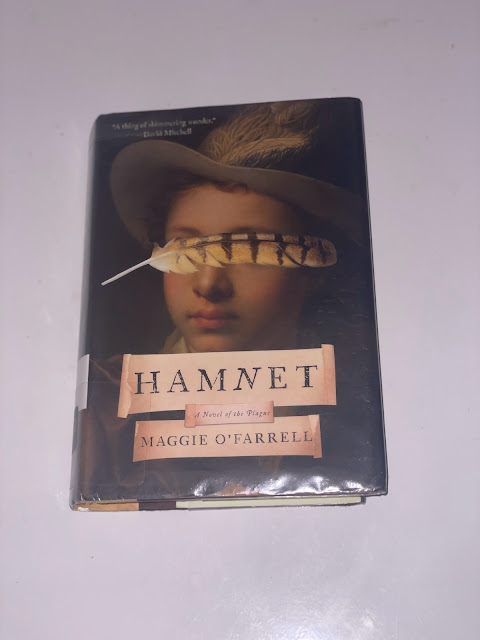Welcome to Book of the Month! The Book of this Month is a historical fiction titled Hamnet by Maggie O'Farrell. I know people say awards don't matter (don't believe them by the way) but I still want to start off with the awards this book has won. It won the 2020 Women's Prize for Fiction and the 2021 National Book Critics Circle Award for Fiction. It was named "Novel of the Year" at the Dalkey Literary Awards, was shortlisted for the Walter Scott Prize, and longlisted for the Andrew Carnegie Medal for Excellence in Fiction. I say all of these to show that this book is a masterpiece. It's O'Farrell's magnum opus.
Remember how I said here that I didn't want to read about a pandemic or similar stuff this soon. It turns out I lied Lol. Because Hamnet is literally about The Plague. The book, set in the 1580s, is about a young Latin tutor—constantly bullied by his violent father—who falls wildly in love with a weird, remarkable woman older than him. She is known throughout town for her eccentricity and her ability to heal people and to understand plants and potions. She falls in love with the tutor right back and they get married, and settle in Stratford. There, she becomes an extraordinary mother, a force in the life of her husband who recently started a career miles away in London theatre scene, and their three children. Life is just getting stable when their beloved young son succumbs to The Plague. It is a story about love, family, and more importantly, the many ways grief can ravage even the most perfect union. It shows how people react so different to grief.
What makes this book even more phenomenal is the idea behind it. The author is basically speculating about Shakespeare's (Yes, same one) life. Apparently, in real life Shakespeare did have a son (named Hamnet) who died suddenly and who was the inspiration behind the most celebrated play of all time, Hamlet. Scholars have tried to connect the death of Hamnet to Hamlet and its themes but O'Farrell outshines them by telling of Hamnet's very short and beautiful life, his tragic death, and his parents' love for him. Of course, being in the 16th century, there is not that much detail on the life of Agnes (who was actually known as Anne Hathaway in real life), William (yes, THE SHAKESPEARE. Though O'Farrell never actually uses his name in the book), Hamnet, and the other kids. But O'Farrell presents a plausible story of their lives in rural England.
The author has a cadence to writing that is truly masterful. The way she brings alive 16th century Stratford is something most writers can only dream of. Each line, each word, each description is painstaking in how it shows us that this was not the random musings of a creative. This was the hard work of a researcher and writer. We can almost smell the plants and potions Agnes uses to heal people. We feel the glover's workshop come alive. We experience the quotidian of a people with no technology, no TV, and who travel on horses. What manner of brilliance. Remember how I implied here that a portrayal of the 22nd century mentioning red velvet cupcakes is hilarious/silly at best and just stupid at worst. There is none of that rookie mistake in this book. This is a historical novel that takes you on a voyage you are not willing to get off from. It's magnificent, searing, and the story is engrossing. There is something the author did: taking us through the process of how a communicable/contagious disease gets started and how it spreads that was something to behold. Art, baby. Art.
"For the pestilence to reach Warwicksire, England, in the summer of 1596, two events need to occur in the lives of two separate people, and then these people need to meet."
A particular storyline that stands out is the searing intensity of motherhood. The way it can literally tear you apart (during childbirth) and the unimaginable way it can destroy you during the loss (whether literally in death or metaphorically) of the child(ren). What a brilliant book. Have I mentioned the craftsmanship of this book?
This is a complex book for several reasons so I know it may be a little dense to get started with but if you can hold on a few pages, I promise it gets so much better. It's also set in the 1590s so of course much of the writing, dialogue mimics that era, and I know it may make consuming this book more challenging or tedious for some to get through. I will say that I've also always preferred for books to be "simple" and easy to get through. That said, whereas most writers choose complex writing for no reason other than to sound smart, O'Farrell wields it for a more authentic purpose. And the book is the better for it.
If you read this book, let me know what you think!
Love,
I



No comments